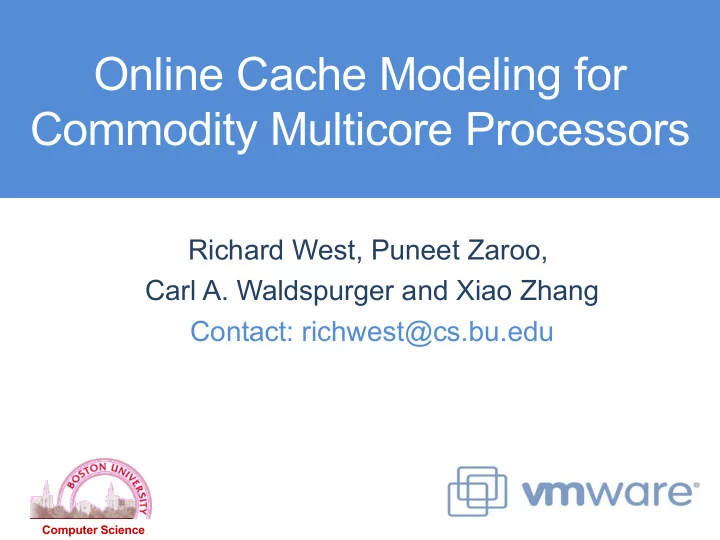

Online Cache Modeling for Commodity Multicore Processors Richard West, Puneet Zaroo, Carl A. Waldspurger and Xiao Zhang Contact: richwest@cs.bu.edu Computer Science
The “Big Picture” . . . Application threads VM VM VM VM VM . . . VCPU VCPU VCPU Interconnect PCPU PCPU PCPU PCPU PCPU PCPU PCPU PCPU Cores/HTs Cores/HTs . . . . . . . . . . . . Shared LLC Shared LLC Socket Socket
Proliferation of CMPs • Chip Multiprocesors (CMPs) have multiple cores on same chip • CMP cores usually share last-level cache (LLC) and compete for memory bus bandwidth • Competition for microarchitectural resources by co-running workloads can lead to highly-variable performance – Potential for poor performance isolation
The Software Challenge • CMPs manage shared h/w resources (e.g., cache space, memory bandwidth) in opaque manner to s/w • Software systems cannot easily optimize for efficient resource utilization or QoS without improved visibility and control over h/w resources – e.g., Cache conflict misses can incur several hundred clock cycle penalties for off-chip memory stalls
Hardware Solutions • Provide performance isolation using cache partitioning – Optimal partition size? – Utility of cache space to a workload? • Hardware-assisted miss-ratio (and miss-rate) curves (MRCs) – not applicable to commodity multicore processors
Improved Cache Management • Expose state of shared caches (and other microarchitectural resources) to OS / hypervisor – Fairer / more efficient co-scheduling – Reduced resource contention – How do we do this on commodity CMPs?
Current Software Solutions • Page coloring – Can reduce cache conflicts – Recoloring pages can be expensive for varying working set sizes and workloads • S/W-generated MRCs – Existing solutions require special h/w support • e.g., RapidMRC uses SDAR on POWER5 – Potentially high overhead • e.g., RapidMRC takes > 80ms on POWER5
Our Approach • Online cache modeling for commodity CMPs • Leverage commonly-available hardware performance counters – Construct cache occupancy estimators for individual workloads competing for cache – Construct cache performance curves (MRCs) using occupancy predictions – Low-cost and online
Basic Occupancy Model • Leverage two performance events: – local misses to thread τ l : m l – misses by every other thread τ o sharing – cache: m o – Misses drive cache line fills • Assume C cache lines accessed uniformly at random • E’ = E + (1 – E/C)·m l – (E/C)·m o • E’ = updated occupancy of τ l, , E = old value
Extended Occupancy Model • Basic approach assumes uniform cache-line access • Set associativity and LRU line replacement breaks this assumption • Add support for likelihood of line reuse – Use cache hit information
Extended Occupancy Model • Uses four performance events: – As for basic model plus • Local hits (h l ) and hits by all other threads (h o ) • Now: E’ = E·(1-m o p l ) + (C-E) ·m l p o -- Equation 1 p l is probability miss falls on line for τ l P o is probability miss falls on line for τ o
Reuse Frequency • Approximate LRU with LFU: – Model cacheline reuse by τ l and τ o, respectively, as: r l = (h l + m l ) /E r o = (h o + m o ) / (C – E)
Approximating LRU Effects • Model evictions due to misses inversely proportional to reuse frequencies: p o / p l = r l / r o • Given a miss must fall on some line: p l ·E + p o ·(C-E) = 1 Can calculate p l and p o and substitute into Equation 1
Occupancy Experiments • Used Intel’s CMPSched$im – Binary execution of SPEC workloads – Modeled 2- and 4-core CMPs • 32KB 4-way per-core L1 • 4MB 16-way shared L2 • 64 byte cache line size – Sample perf counters every 1ms – Average occupancies over 100 ms intervals
Occupancy Results Quadcore – 4 co-runners (3 shown) mcf art00 wupwise00
Occupancy Results Quadcore – 10 co-runners (3 shown) mcf art00 wupwise00 Model tolerant of over-committed situations.
Cache Performance Curves • Modeled performance (MPKI, MPKR, MPKC, CPKI,…) as function of cache occupancy • Implemented CAFÉ scheduling framework in VMware ESX Server – 4-core 2.0 GHz Intel Xeon E5535 w/ 4GB RAM and 4MB L2 cache per 2-cores – Update workload occupancies every 2ms using basic model (2 perf ctrs) • 320 cycles overhead for occupancy update fn
Online Generation of Utility Curves • Curve Types – Miss-ratio curve, y-axis being Misses-Per-Kilo-Instructions – Miss-rate curve, y-axis being Misses-Per-Kilo-Cycles – CPKI curve, y-axis being Cycles-Per-Kilo-Instructions • Implementation issues – Monotonicity enforcement – Lack of updates across entire cache – Duty-cycle modulation enforcement – MPKC curves sensitive to memory bandwidth contention mcf running under different amounts of memory read bandwidth
MRC Results • Quantized into 8 occupancy buckets • Configurable interval for curve generation frequency (here, several seconds) • Expect monotonicity – Higher cache occupancy, fewer misses per instruction – Except on phase changes • Monotonic enforcement algorithm updates MRC readings in order of bucket reference (highest to lowest)
Online MRC: Accuracy • 6 apps on 2 cores sharing L2, each in a single-CPU VM • Using page-coloring measurement as comparison baseline
Online MRC: Case Study • Running mcf with different co-runners Before monontonic enforcement After monotonic enforcement
Application of Utility Curves • Guidance to improve fairness – CPU time compensation based on estimated performance degradation due to CMP resource contention • Guidance to improve performance – Smart scheduling placement based on predicted cache space allocation among co-runners
Future Work • Application of occupancy prediction to hardware- aided cache partitioning / enforcement • Investigate techniques to improve coverage of cache space (0-100%) for utility curve generation – Co-runner interference control – MRCs at different tie granularities • Online phase change detection
Recommend
More recommend